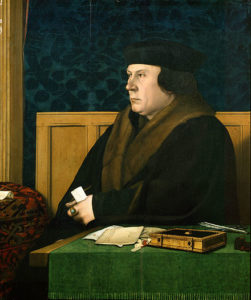1540
Thomas Cromwell is executed
Fans of “Wolf Hall” will be well acquainted with the career of Thomas Cromwell (1485-1540), the low-born administrator who rose to be Earl of Essex and Henry VIII’s right-hand man. He was a leading figure in the break of the Church of England with Rome, taking steps that led historians to term him a secret Protestant sympathizer.
The son of a Surrey merchant, Cromwell may have spent time as a mercenary soldier on the Continent before becoming a lawyer and merchant. He entered politics in the 1520s and sat as a Member of Parliament, serving the interests of his patron Cardinal Wolsey, the Chancellor. He survived Wolsey’s fall; Henry VIII had noticed his talents and gave him ever greater responsibilities in the 1530s. He helped engineer the divorce of Katharine of Aragon, the fall of Sir Thomas More, the break with Rome, the Royal Supremacy and Henry’s marriage with Anne Boleyn. He did not get on well with the new Queen; Anne attacked him publicly. When she could not produce the male heir Henry desired, Cromwell led the attack on her that resulted in her execution.
Though Henry remained a doctrinal Catholic all his life (save for replacing the pope with himself as head of the English Church), he allowed Cromwell to proceed with three projects that might be seen to advance the cause of Protestantism. The first was the Suppression of the Monasteries which saw the abolition of the monastic system and the seizure of vast church wealth and lands by the crown. The second was the production of an English-language Bible (with a full-page portrait of the king at the front) and the third was a marriage to a Protestant princess. This last move proved fatal to Cromwell.
Henry was finally given his long-sought male heir with the birth of Prince Edward in 1537 by third wife Jane Seymour. Jane had died soon after and Cromwell sought a wife for Henry who might bring the support of Protestant princes on the Continent. The choice fell on German noblewoman Anne of Cleves but the king was so repelled by her in person that a divorce was quickly undertaken. Cromwell’s Catholic enemies at court used this opportunity to poison Henry’s ear against his chief advisor. The iron rule of Henrician politics, as learned by Wolsey, Queen Anne and Sir Thomas More, was that failure meant death. Cromwell went to the block in 1540 though Henry was later said to have lamented that “he had put to death the most faithful servant he ever had”.
